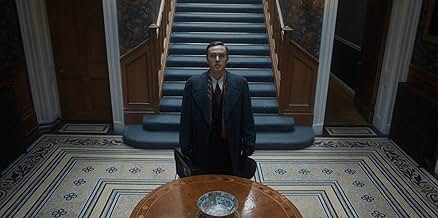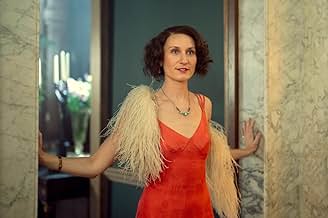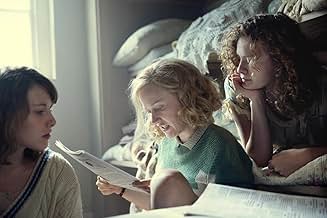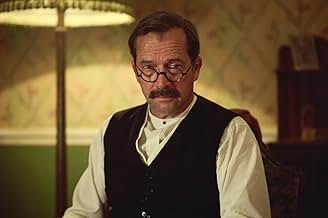Las hermanas Mitford, se negaron a seguir las reglas del juego y cuyas vidas, a menudo escandalosas, ocuparon los titulares de todo el mundo.Las hermanas Mitford, se negaron a seguir las reglas del juego y cuyas vidas, a menudo escandalosas, ocuparon los titulares de todo el mundo.Las hermanas Mitford, se negaron a seguir las reglas del juego y cuyas vidas, a menudo escandalosas, ocuparon los titulares de todo el mundo.
Explorar episodios
Opiniones destacadas
I must say, my teeth were grinding even before I started to watch... reading that the Milford girls were 'independent minded rule breakers who threw off convention'. They weren't. They came from a background so privileged and entitled that the 'rules' others lived by were not even recognized by them. They didn't break rules knowingly, they were unaware of them.
The pre show blurb went on to speak of their lack of education, when in fact they were educated at home like so many women in history. A university education was never the only form of education. Their letters alone will tell any reader as much about what they did know as what they didn't.
The first episode, seemed to be the cliched cartoonish version of the English upper classes between the wars which holds sway with the chattering classes now.
But it did improve, its talented cast brought out some of the layers in their bilateral relationships, and the increasing clouds on the political horizons began to make their presence felt amidst the unfathomable stupidity of at least three of these under-employed but seemingly intelligent women.
What remains unpalatable (the commitment to fascism before, during and after the war of at least two of these daughters, and the similarly odd communist sympathies of another) is almost impossible to understand, other than to reflect on how divorced from the reality of most people they really were; by class, by design and by history.
Their characters are individually interesting when one reads their diaries, letters, work etc...but perhaps the story of these siblings cannot be told collectively without making it seem glib and crass, given its relationship to the sweep of history in the 20c.
The pre show blurb went on to speak of their lack of education, when in fact they were educated at home like so many women in history. A university education was never the only form of education. Their letters alone will tell any reader as much about what they did know as what they didn't.
The first episode, seemed to be the cliched cartoonish version of the English upper classes between the wars which holds sway with the chattering classes now.
But it did improve, its talented cast brought out some of the layers in their bilateral relationships, and the increasing clouds on the political horizons began to make their presence felt amidst the unfathomable stupidity of at least three of these under-employed but seemingly intelligent women.
What remains unpalatable (the commitment to fascism before, during and after the war of at least two of these daughters, and the similarly odd communist sympathies of another) is almost impossible to understand, other than to reflect on how divorced from the reality of most people they really were; by class, by design and by history.
Their characters are individually interesting when one reads their diaries, letters, work etc...but perhaps the story of these siblings cannot be told collectively without making it seem glib and crass, given its relationship to the sweep of history in the 20c.
Let me get one thing out of the way first. They can never get the hairstyles right in these period pieces. I read once that art evaluators always look at the hair first when trying to see if a painting is fake; counterfeiters just can't get it right. Nor can modern hairstylists. The sisters' hair was completely anomalous.
And now, why was it sanitised? Nancy, who narrated the series was cast as a wise elder sister on good terms with all of her siblings to begin with. In fact she bullied them terribly, even into adulthood with a waspish wit and sarcasm.
Tom was a fascist but portrayed as a good egg in the series; he even refused to fight against Germany.
Muv was a fascist in real life. So deep were her leanings that she separated from Farve because of his patriotism for the UK. Yet in the series she's portrayed as a gentle, mother goddess with no political views, indeed, if anything, shocked at the doings of her two fascist and Nazi daughters.
Pam was a virulent anti-Semite who stated, along with her husband, on many occasions that all Jews should be killed. Yet she's portrayed as a jolly hockey sticks hoyden and a sympathetic character.
Unity was a Nazi and that was made clear in the show. But for goodness sake! They brought modern psychology into it. The actress playing her had clearly been directed to play her as neurodivergent.
Jessica and Diana seemed to be the only ones who were, more or less, true to life.
Someone of my age and generation would know about this family from parents, newspapers, Nancy's novels and Jessica's work. They were a pretty gruesome bunch. Perhaps historical accuracy would have made the series far too depressing.
As it was, I watched the lot in 24 hours. I enjoyed it but I felt disappointed and had a sense that an opportunity was missed. I am nonetheless looking forward to the second season.
A bit of a mixed review, I'm afraid. I'd say watch it but with no great expectations.
And now, why was it sanitised? Nancy, who narrated the series was cast as a wise elder sister on good terms with all of her siblings to begin with. In fact she bullied them terribly, even into adulthood with a waspish wit and sarcasm.
Tom was a fascist but portrayed as a good egg in the series; he even refused to fight against Germany.
Muv was a fascist in real life. So deep were her leanings that she separated from Farve because of his patriotism for the UK. Yet in the series she's portrayed as a gentle, mother goddess with no political views, indeed, if anything, shocked at the doings of her two fascist and Nazi daughters.
Pam was a virulent anti-Semite who stated, along with her husband, on many occasions that all Jews should be killed. Yet she's portrayed as a jolly hockey sticks hoyden and a sympathetic character.
Unity was a Nazi and that was made clear in the show. But for goodness sake! They brought modern psychology into it. The actress playing her had clearly been directed to play her as neurodivergent.
Jessica and Diana seemed to be the only ones who were, more or less, true to life.
Someone of my age and generation would know about this family from parents, newspapers, Nancy's novels and Jessica's work. They were a pretty gruesome bunch. Perhaps historical accuracy would have made the series far too depressing.
As it was, I watched the lot in 24 hours. I enjoyed it but I felt disappointed and had a sense that an opportunity was missed. I am nonetheless looking forward to the second season.
A bit of a mixed review, I'm afraid. I'd say watch it but with no great expectations.
This drama portrays life in the 1930s of the extraordinary Mitford family.
In fact it could have been called Extraordinary rather than Outrageous.
The protagonist is Nancy Mitford who became an established author.
The telling of their lives underlines just how autobiographical Nancy's most famous publications really are, The Pursuit of Love and Love in a Cold Climate.
Their pursuit of love wasn't really love at all, it was the pursuit of an eligible men with an income that would keep the Mitford sisters in the style of life to which they were accustomed.
As such, in the 1930s, they had very little to offer and their whole existence seemed to be aimed at "coming out" or presented to society at the annual debutants ball.
Very shallow indeed, but these were not ordinary women they held very strong views not always in alignment with one another, so much so that Unity and Diana finding themselves embroiled in Fascism.
Anyway, it is a good drama and is enhanced with a mainly unfamiliar cast. Only Anna Chancellor, as the mother, being instantly recognizable.
In fact it could have been called Extraordinary rather than Outrageous.
The protagonist is Nancy Mitford who became an established author.
The telling of their lives underlines just how autobiographical Nancy's most famous publications really are, The Pursuit of Love and Love in a Cold Climate.
Their pursuit of love wasn't really love at all, it was the pursuit of an eligible men with an income that would keep the Mitford sisters in the style of life to which they were accustomed.
As such, in the 1930s, they had very little to offer and their whole existence seemed to be aimed at "coming out" or presented to society at the annual debutants ball.
Very shallow indeed, but these were not ordinary women they held very strong views not always in alignment with one another, so much so that Unity and Diana finding themselves embroiled in Fascism.
Anyway, it is a good drama and is enhanced with a mainly unfamiliar cast. Only Anna Chancellor, as the mother, being instantly recognizable.
I loved this book when I read it a few yers ago. When I heard it was being made into a series, I couldn't wait for it to come out. It DOES NOT disappoint.
For those giving this low marks, you must remember the family was all about appearances. Wooden displays of emotion are spot on. As the sisters tiptoe around their political explorations, i would be shocked if their portrays were anything more than this.
The production design is exquisite. I can feel the threadbare clothing. It's all a facade after losing the family fortune, yet they carry on as if society expects them to, while it's far from reality.
All of the characters are great. Nancy, Diana, and Unity are spot on. I'd love to see more of the other 3 girls and more of Tom's journey. Toby Regbo needs a better platform. He's underrated.
The sound track is perfection. No, it's not typical 1930s Cole Porter, but the percussion heavy background is delightful - mirroring the pulse of the times leading up to this horrible war.
Highly recommend!
For those giving this low marks, you must remember the family was all about appearances. Wooden displays of emotion are spot on. As the sisters tiptoe around their political explorations, i would be shocked if their portrays were anything more than this.
The production design is exquisite. I can feel the threadbare clothing. It's all a facade after losing the family fortune, yet they carry on as if society expects them to, while it's far from reality.
All of the characters are great. Nancy, Diana, and Unity are spot on. I'd love to see more of the other 3 girls and more of Tom's journey. Toby Regbo needs a better platform. He's underrated.
The sound track is perfection. No, it's not typical 1930s Cole Porter, but the percussion heavy background is delightful - mirroring the pulse of the times leading up to this horrible war.
Highly recommend!
Outrageous is a long-overdue dramatisation of the Mitford sisters, bringing to life one of the most extraordinary and divisive families in 20th-century Britain. Set against the backdrop of a country on the brink of war, the show cleverly frames the story through Nancy's eyes, allowing for a rich, intimate view of the family's tangled dynamics rather than a dry historical checklist. The acting and casting are superb, each sister is pitch-perfect, capturing their eccentricities and contradictions with warmth, sharpness and real emotional weight. Even moments I thought I knew surprised me in performance. My only complaint is that we don't have a second series yet. It's brilliantly addictive, almost impossible not to binge in one go.
¿Sabías que…?
- TriviaThe opening scene takes place in September 1931 and the closing scene of season one takes place in January 1937. Nancy ages from 26 to 32 years old; Pam was 23-29, Tom was 22-28, Diana was 21-26, Unity was 17-22, Jessica was 14-19, and youngest sister Deborah was 11 to 16 years old during this time period.
Selecciones populares
Inicia sesión para calificar y agrega a la lista de videos para obtener recomendaciones personalizadas
- How many seasons does Outrageous have?Con tecnología de Alexa
Detalles
Contribuir a esta página
Sugiere una edición o agrega el contenido que falta




































